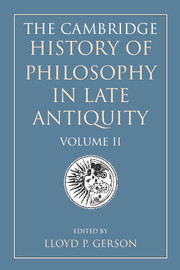Book contents
- Frontmatter
- VI Late Platonism
- Introduction to Part VI
- 32 From Constantine to Justinian
- 33 Plutarch of Athens
- 34 Syrianus
- 35 Proclus
- 36 Ammonius Hermeiou and his school
- 37 Damascius
- 38 Olympiodorus
- 39 Simplicius of Cilicia
- 40 John Philoponus
- 41 Priscian of Lydia and Pseudo-Simplicius on the soul
- VII The third encounter of Christianity with ancient Greek philosophy
- VIII Philosophy in transition
- Appendix: List of works of ancient authors
- List of abbreviations
- Bibliography
- Index locorum
- General index
- References
35 - Proclus
from VI - Late Platonism
Published online by Cambridge University Press: 28 May 2011
- Frontmatter
- VI Late Platonism
- Introduction to Part VI
- 32 From Constantine to Justinian
- 33 Plutarch of Athens
- 34 Syrianus
- 35 Proclus
- 36 Ammonius Hermeiou and his school
- 37 Damascius
- 38 Olympiodorus
- 39 Simplicius of Cilicia
- 40 John Philoponus
- 41 Priscian of Lydia and Pseudo-Simplicius on the soul
- VII The third encounter of Christianity with ancient Greek philosophy
- VIII Philosophy in transition
- Appendix: List of works of ancient authors
- List of abbreviations
- Bibliography
- Index locorum
- General index
- References
Summary
LIFE AND WORK
Proclus was born in 412 in Byzantium in a Lycian family, still faithful to the old Hellenic religion in a society already dominated by Christianity. The talented young man did not opt for a career in the imperial administration as his father had done, but decided to devote his life to philosophy. After completing his studies in Alexandria, Proclus arrived in Athens in 430 where he joined the Platonic Academy and was first educated by the elderly Plutarch. Under Plutarch the Athenian Academy had turned to the new form of Platonic philosophy that was initiated by Plotinus and propagated by Porphyry. Under the influence of Iamblichus, this Platonic philosophy had become more and more linked to the old beliefs and rites of paganism, of which it offered a rational justification. This tendency increased when Syrianus became the new head of the Academy in 432.1 During more than fifteen years Proclus not only followed Syrianus’ courses, but was also initiated by him in theurgic rituals. Proclus was deeply influenced by his master and he often praises him lavishly (cf. In Parm. 1.618.2– 9). After Syrianus’ death (around 437), he became the head of the school and thus ‘successor (diadochos) of Plato’, a position he held for almost fifty years until his death in 485.
- Type
- Chapter
- Information
- The Cambridge History of Philosophy in Late Antiquity , pp. 630 - 653Publisher: Cambridge University PressPrint publication year: 2000
References
- 2
- Cited by

